Factors Influencing Hospitality Consumer Behaviour: A Detailed Report
VerifiedAdded on 2023/01/19
|12
|3831
|30
Report
AI Summary
This report provides a comprehensive analysis of hospitality consumer behavior, focusing on the factors that influence consumer attitudes and decision-making processes within the hospitality industry. It begins with an introduction to consumer behavior, defining key concepts and exploring various influences such as cultural, social, personal, and psychological factors. The report uses Radisson Blu Hotel as a case study. The report then maps the path to purchase, outlining the stages of decision-making, including problem recognition, information search, comparison of alternatives, purchase decision, and post-purchase evaluation. Different levels of consumer decision-making are discussed, including extensive, limited, and routine problem-solving. The report further evaluates appropriate research forms for understanding influences on consumer decision-making processes, differentiating between B2B and B2C approaches and their respective market research methodologies. Finally, the report examines how marketers influence various stages of the hospitality consumer decision-making process, considering elements of the marketing mix, the impact of technology, and the influence of heuristics. The report concludes by summarizing key findings and emphasizing the importance of understanding consumer behavior for effective marketing and service delivery in the hospitality sector.
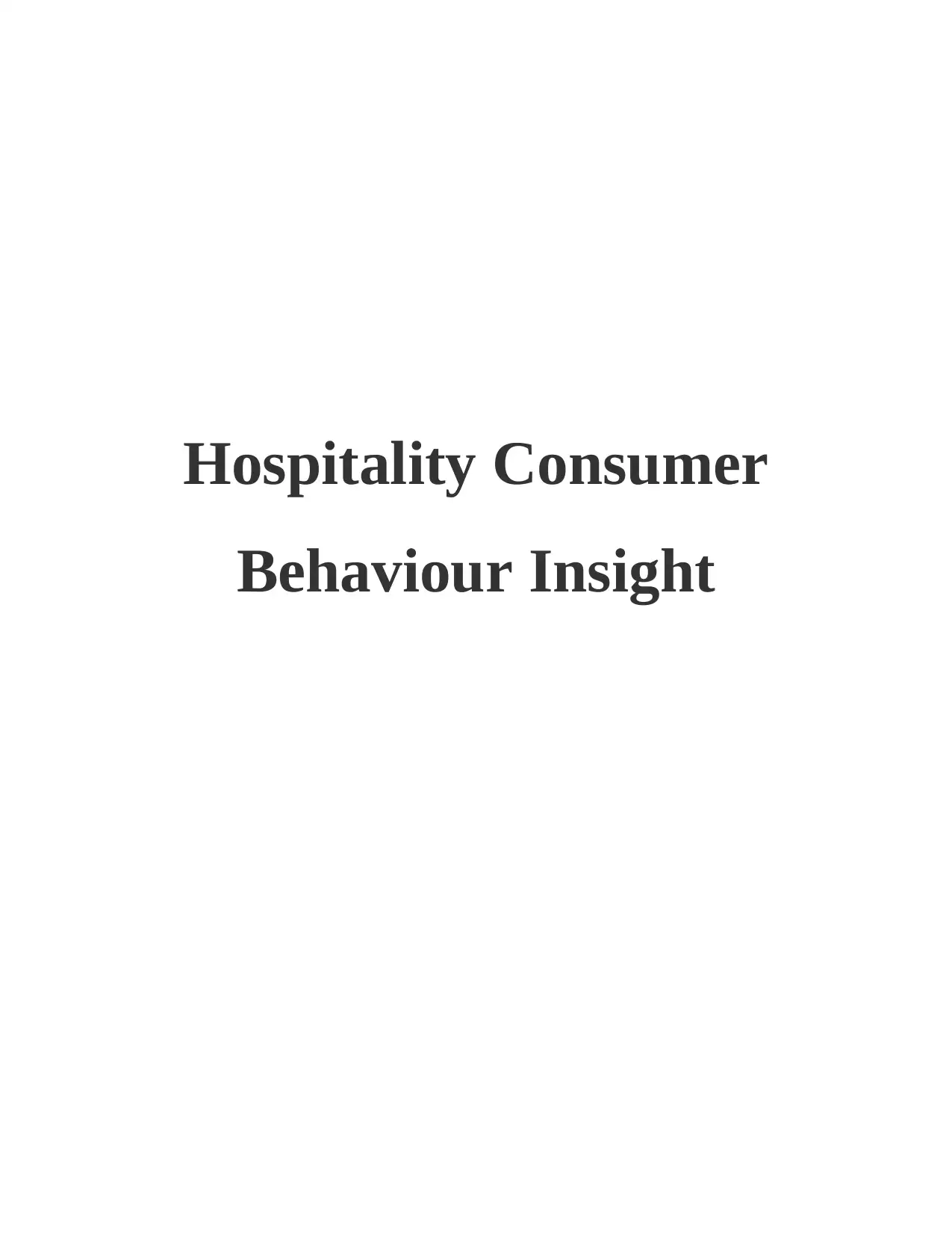
Hospitality Consumer
Behaviour Insight
Behaviour Insight
Paraphrase This Document
Need a fresh take? Get an instant paraphrase of this document with our AI Paraphraser
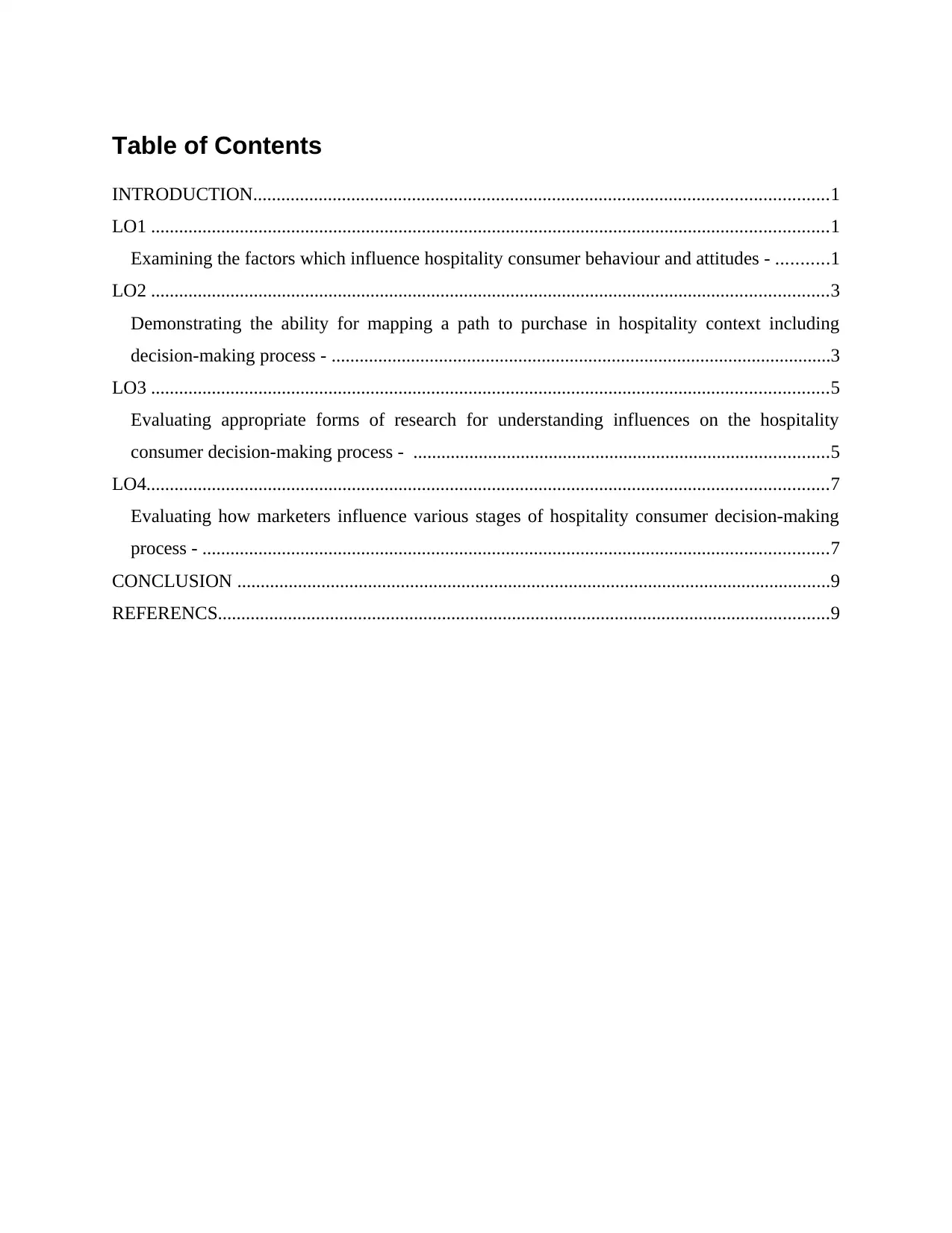
Table of Contents
INTRODUCTION...........................................................................................................................1
LO1 .................................................................................................................................................1
Examining the factors which influence hospitality consumer behaviour and attitudes - ...........1
LO2 .................................................................................................................................................3
Demonstrating the ability for mapping a path to purchase in hospitality context including
decision-making process - ...........................................................................................................3
LO3 .................................................................................................................................................5
Evaluating appropriate forms of research for understanding influences on the hospitality
consumer decision-making process - .........................................................................................5
LO4..................................................................................................................................................7
Evaluating how marketers influence various stages of hospitality consumer decision-making
process - ......................................................................................................................................7
CONCLUSION ...............................................................................................................................9
REFERENCS...................................................................................................................................9
INTRODUCTION...........................................................................................................................1
LO1 .................................................................................................................................................1
Examining the factors which influence hospitality consumer behaviour and attitudes - ...........1
LO2 .................................................................................................................................................3
Demonstrating the ability for mapping a path to purchase in hospitality context including
decision-making process - ...........................................................................................................3
LO3 .................................................................................................................................................5
Evaluating appropriate forms of research for understanding influences on the hospitality
consumer decision-making process - .........................................................................................5
LO4..................................................................................................................................................7
Evaluating how marketers influence various stages of hospitality consumer decision-making
process - ......................................................................................................................................7
CONCLUSION ...............................................................................................................................9
REFERENCS...................................................................................................................................9
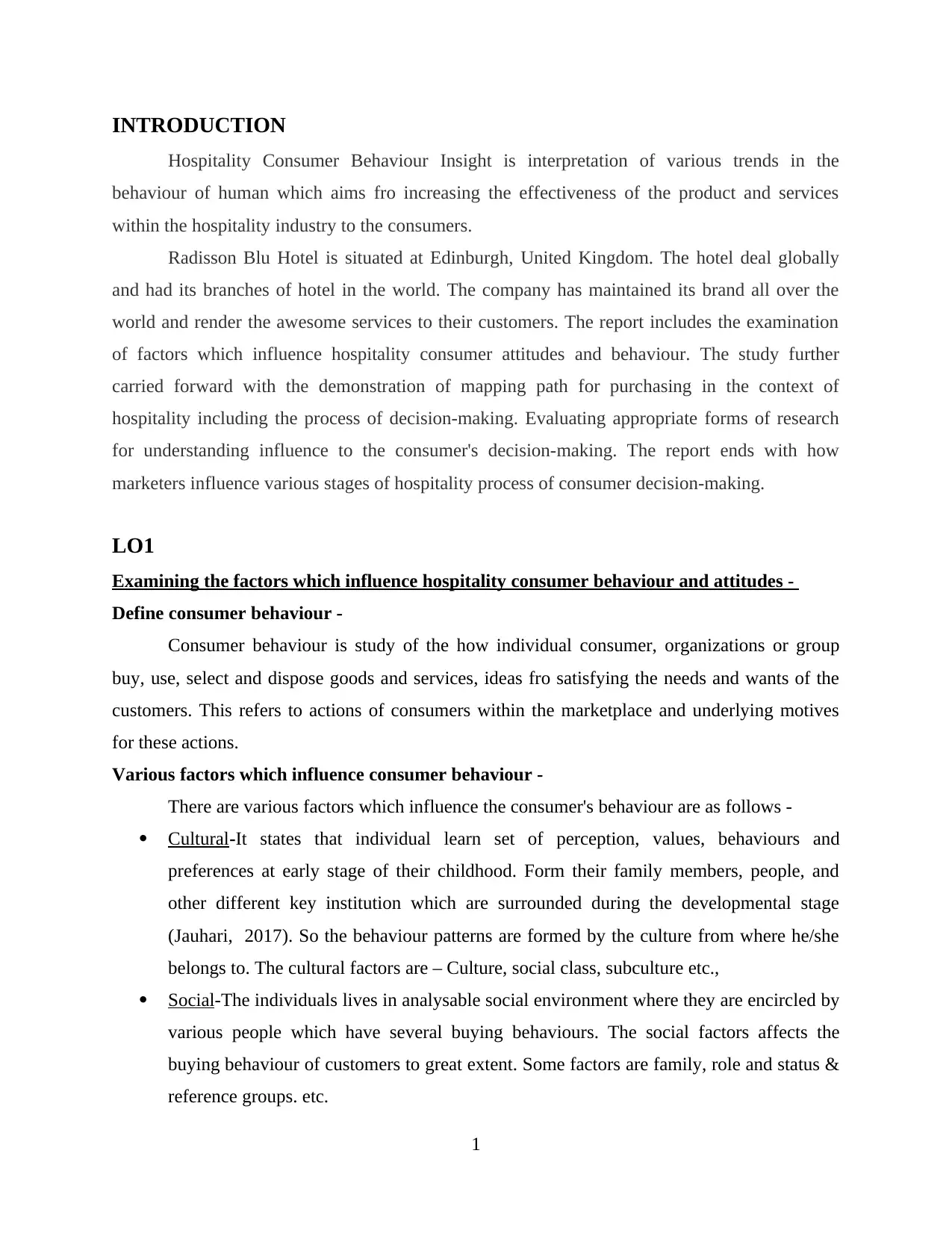
INTRODUCTION
Hospitality Consumer Behaviour Insight is interpretation of various trends in the
behaviour of human which aims fro increasing the effectiveness of the product and services
within the hospitality industry to the consumers.
Radisson Blu Hotel is situated at Edinburgh, United Kingdom. The hotel deal globally
and had its branches of hotel in the world. The company has maintained its brand all over the
world and render the awesome services to their customers. The report includes the examination
of factors which influence hospitality consumer attitudes and behaviour. The study further
carried forward with the demonstration of mapping path for purchasing in the context of
hospitality including the process of decision-making. Evaluating appropriate forms of research
for understanding influence to the consumer's decision-making. The report ends with how
marketers influence various stages of hospitality process of consumer decision-making.
LO1
Examining the factors which influence hospitality consumer behaviour and attitudes -
Define consumer behaviour -
Consumer behaviour is study of the how individual consumer, organizations or group
buy, use, select and dispose goods and services, ideas fro satisfying the needs and wants of the
customers. This refers to actions of consumers within the marketplace and underlying motives
for these actions.
Various factors which influence consumer behaviour -
There are various factors which influence the consumer's behaviour are as follows -
Cultural-It states that individual learn set of perception, values, behaviours and
preferences at early stage of their childhood. Form their family members, people, and
other different key institution which are surrounded during the developmental stage
(Jauhari, 2017). So the behaviour patterns are formed by the culture from where he/she
belongs to. The cultural factors are – Culture, social class, subculture etc.,
Social-The individuals lives in analysable social environment where they are encircled by
various people which have several buying behaviours. The social factors affects the
buying behaviour of customers to great extent. Some factors are family, role and status &
reference groups. etc.
1
Hospitality Consumer Behaviour Insight is interpretation of various trends in the
behaviour of human which aims fro increasing the effectiveness of the product and services
within the hospitality industry to the consumers.
Radisson Blu Hotel is situated at Edinburgh, United Kingdom. The hotel deal globally
and had its branches of hotel in the world. The company has maintained its brand all over the
world and render the awesome services to their customers. The report includes the examination
of factors which influence hospitality consumer attitudes and behaviour. The study further
carried forward with the demonstration of mapping path for purchasing in the context of
hospitality including the process of decision-making. Evaluating appropriate forms of research
for understanding influence to the consumer's decision-making. The report ends with how
marketers influence various stages of hospitality process of consumer decision-making.
LO1
Examining the factors which influence hospitality consumer behaviour and attitudes -
Define consumer behaviour -
Consumer behaviour is study of the how individual consumer, organizations or group
buy, use, select and dispose goods and services, ideas fro satisfying the needs and wants of the
customers. This refers to actions of consumers within the marketplace and underlying motives
for these actions.
Various factors which influence consumer behaviour -
There are various factors which influence the consumer's behaviour are as follows -
Cultural-It states that individual learn set of perception, values, behaviours and
preferences at early stage of their childhood. Form their family members, people, and
other different key institution which are surrounded during the developmental stage
(Jauhari, 2017). So the behaviour patterns are formed by the culture from where he/she
belongs to. The cultural factors are – Culture, social class, subculture etc.,
Social-The individuals lives in analysable social environment where they are encircled by
various people which have several buying behaviours. The social factors affects the
buying behaviour of customers to great extent. Some factors are family, role and status &
reference groups. etc.
1
⊘ This is a preview!⊘
Do you want full access?
Subscribe today to unlock all pages.

Trusted by 1+ million students worldwide
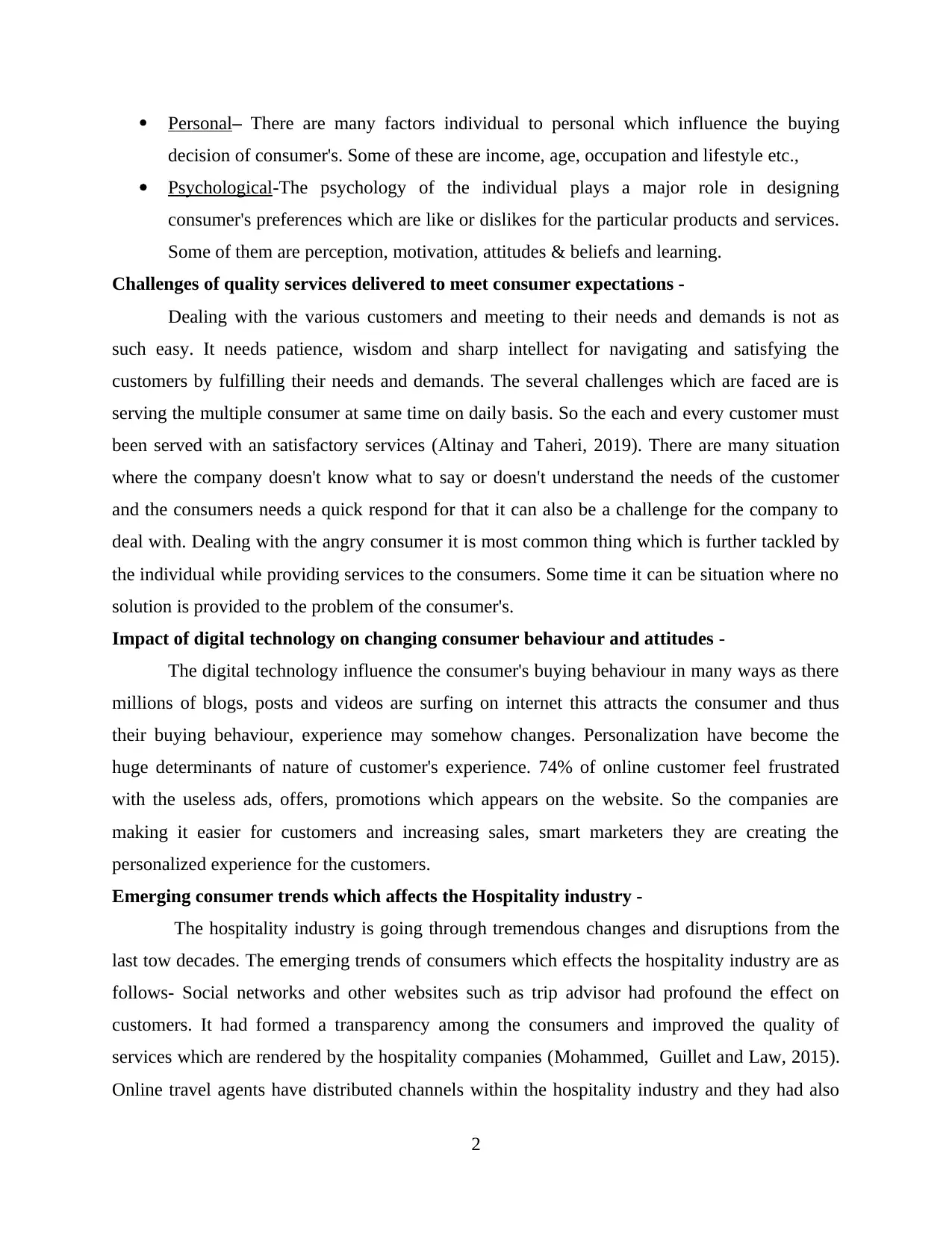
Personal– There are many factors individual to personal which influence the buying
decision of consumer's. Some of these are income, age, occupation and lifestyle etc.,
Psychological-The psychology of the individual plays a major role in designing
consumer's preferences which are like or dislikes for the particular products and services.
Some of them are perception, motivation, attitudes & beliefs and learning.
Challenges of quality services delivered to meet consumer expectations -
Dealing with the various customers and meeting to their needs and demands is not as
such easy. It needs patience, wisdom and sharp intellect for navigating and satisfying the
customers by fulfilling their needs and demands. The several challenges which are faced are is
serving the multiple consumer at same time on daily basis. So the each and every customer must
been served with an satisfactory services (Altinay and Taheri, 2019). There are many situation
where the company doesn't know what to say or doesn't understand the needs of the customer
and the consumers needs a quick respond for that it can also be a challenge for the company to
deal with. Dealing with the angry consumer it is most common thing which is further tackled by
the individual while providing services to the consumers. Some time it can be situation where no
solution is provided to the problem of the consumer's.
Impact of digital technology on changing consumer behaviour and attitudes -
The digital technology influence the consumer's buying behaviour in many ways as there
millions of blogs, posts and videos are surfing on internet this attracts the consumer and thus
their buying behaviour, experience may somehow changes. Personalization have become the
huge determinants of nature of customer's experience. 74% of online customer feel frustrated
with the useless ads, offers, promotions which appears on the website. So the companies are
making it easier for customers and increasing sales, smart marketers they are creating the
personalized experience for the customers.
Emerging consumer trends which affects the Hospitality industry -
The hospitality industry is going through tremendous changes and disruptions from the
last tow decades. The emerging trends of consumers which effects the hospitality industry are as
follows- Social networks and other websites such as trip advisor had profound the effect on
customers. It had formed a transparency among the consumers and improved the quality of
services which are rendered by the hospitality companies (Mohammed, Guillet and Law, 2015).
Online travel agents have distributed channels within the hospitality industry and they had also
2
decision of consumer's. Some of these are income, age, occupation and lifestyle etc.,
Psychological-The psychology of the individual plays a major role in designing
consumer's preferences which are like or dislikes for the particular products and services.
Some of them are perception, motivation, attitudes & beliefs and learning.
Challenges of quality services delivered to meet consumer expectations -
Dealing with the various customers and meeting to their needs and demands is not as
such easy. It needs patience, wisdom and sharp intellect for navigating and satisfying the
customers by fulfilling their needs and demands. The several challenges which are faced are is
serving the multiple consumer at same time on daily basis. So the each and every customer must
been served with an satisfactory services (Altinay and Taheri, 2019). There are many situation
where the company doesn't know what to say or doesn't understand the needs of the customer
and the consumers needs a quick respond for that it can also be a challenge for the company to
deal with. Dealing with the angry consumer it is most common thing which is further tackled by
the individual while providing services to the consumers. Some time it can be situation where no
solution is provided to the problem of the consumer's.
Impact of digital technology on changing consumer behaviour and attitudes -
The digital technology influence the consumer's buying behaviour in many ways as there
millions of blogs, posts and videos are surfing on internet this attracts the consumer and thus
their buying behaviour, experience may somehow changes. Personalization have become the
huge determinants of nature of customer's experience. 74% of online customer feel frustrated
with the useless ads, offers, promotions which appears on the website. So the companies are
making it easier for customers and increasing sales, smart marketers they are creating the
personalized experience for the customers.
Emerging consumer trends which affects the Hospitality industry -
The hospitality industry is going through tremendous changes and disruptions from the
last tow decades. The emerging trends of consumers which effects the hospitality industry are as
follows- Social networks and other websites such as trip advisor had profound the effect on
customers. It had formed a transparency among the consumers and improved the quality of
services which are rendered by the hospitality companies (Mohammed, Guillet and Law, 2015).
Online travel agents have distributed channels within the hospitality industry and they had also
2
Paraphrase This Document
Need a fresh take? Get an instant paraphrase of this document with our AI Paraphraser
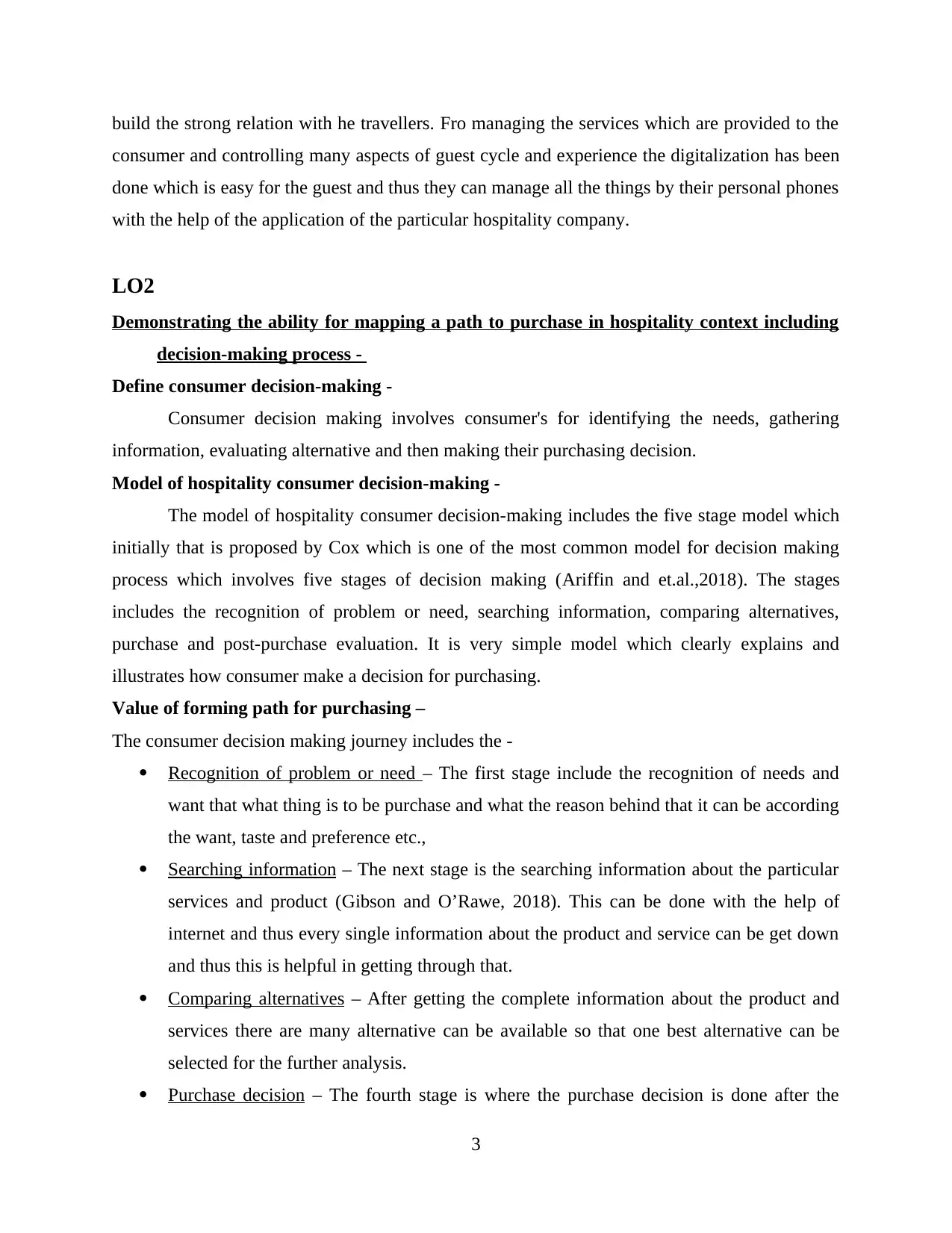
build the strong relation with he travellers. Fro managing the services which are provided to the
consumer and controlling many aspects of guest cycle and experience the digitalization has been
done which is easy for the guest and thus they can manage all the things by their personal phones
with the help of the application of the particular hospitality company.
LO2
Demonstrating the ability for mapping a path to purchase in hospitality context including
decision-making process -
Define consumer decision-making -
Consumer decision making involves consumer's for identifying the needs, gathering
information, evaluating alternative and then making their purchasing decision.
Model of hospitality consumer decision-making -
The model of hospitality consumer decision-making includes the five stage model which
initially that is proposed by Cox which is one of the most common model for decision making
process which involves five stages of decision making (Ariffin and et.al.,2018). The stages
includes the recognition of problem or need, searching information, comparing alternatives,
purchase and post-purchase evaluation. It is very simple model which clearly explains and
illustrates how consumer make a decision for purchasing.
Value of forming path for purchasing –
The consumer decision making journey includes the -
Recognition of problem or need – The first stage include the recognition of needs and
want that what thing is to be purchase and what the reason behind that it can be according
the want, taste and preference etc.,
Searching information – The next stage is the searching information about the particular
services and product (Gibson and O’Rawe, 2018). This can be done with the help of
internet and thus every single information about the product and service can be get down
and thus this is helpful in getting through that.
Comparing alternatives – After getting the complete information about the product and
services there are many alternative can be available so that one best alternative can be
selected for the further analysis.
Purchase decision – The fourth stage is where the purchase decision is done after the
3
consumer and controlling many aspects of guest cycle and experience the digitalization has been
done which is easy for the guest and thus they can manage all the things by their personal phones
with the help of the application of the particular hospitality company.
LO2
Demonstrating the ability for mapping a path to purchase in hospitality context including
decision-making process -
Define consumer decision-making -
Consumer decision making involves consumer's for identifying the needs, gathering
information, evaluating alternative and then making their purchasing decision.
Model of hospitality consumer decision-making -
The model of hospitality consumer decision-making includes the five stage model which
initially that is proposed by Cox which is one of the most common model for decision making
process which involves five stages of decision making (Ariffin and et.al.,2018). The stages
includes the recognition of problem or need, searching information, comparing alternatives,
purchase and post-purchase evaluation. It is very simple model which clearly explains and
illustrates how consumer make a decision for purchasing.
Value of forming path for purchasing –
The consumer decision making journey includes the -
Recognition of problem or need – The first stage include the recognition of needs and
want that what thing is to be purchase and what the reason behind that it can be according
the want, taste and preference etc.,
Searching information – The next stage is the searching information about the particular
services and product (Gibson and O’Rawe, 2018). This can be done with the help of
internet and thus every single information about the product and service can be get down
and thus this is helpful in getting through that.
Comparing alternatives – After getting the complete information about the product and
services there are many alternative can be available so that one best alternative can be
selected for the further analysis.
Purchase decision – The fourth stage is where the purchase decision is done after the
3
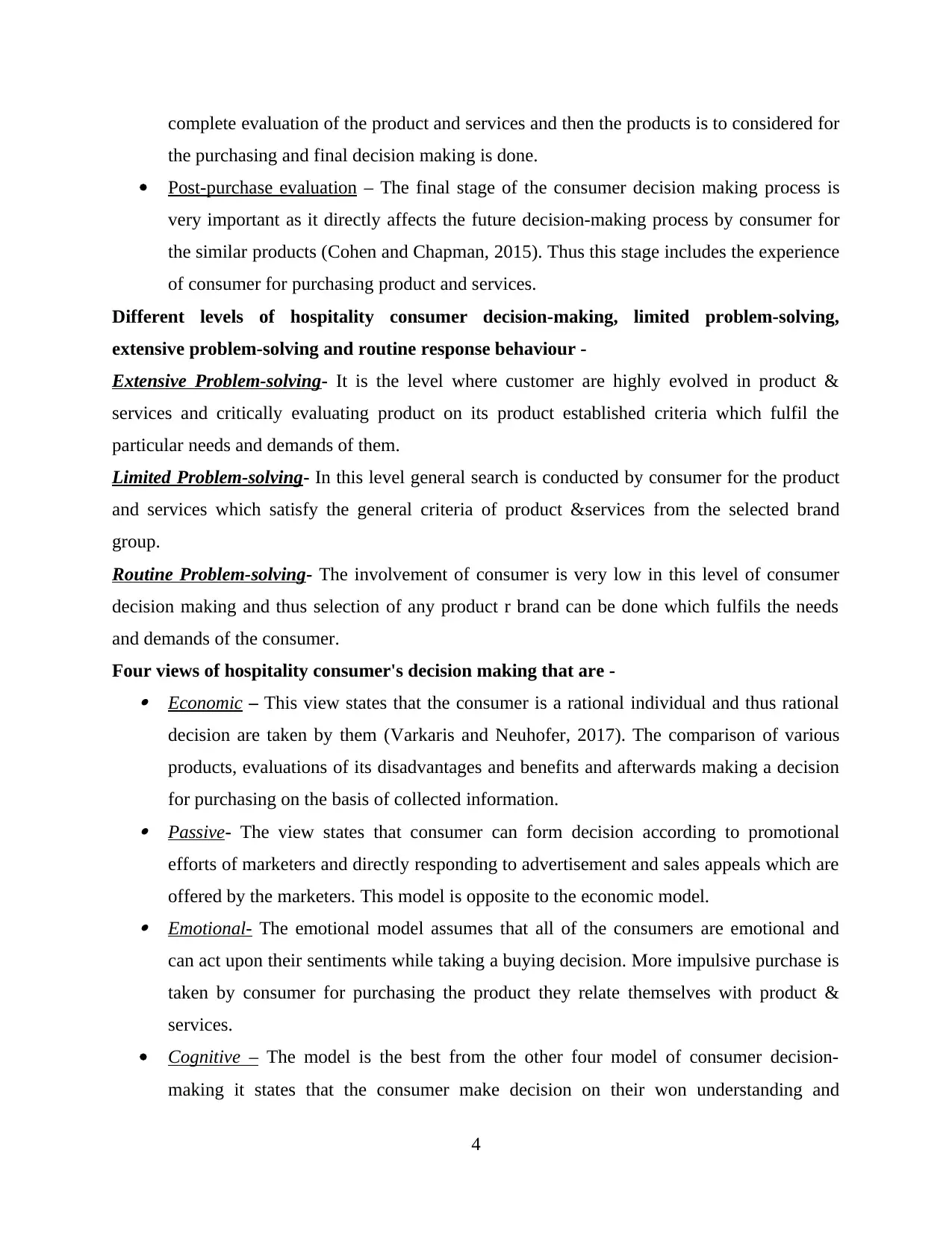
complete evaluation of the product and services and then the products is to considered for
the purchasing and final decision making is done.
Post-purchase evaluation – The final stage of the consumer decision making process is
very important as it directly affects the future decision-making process by consumer for
the similar products (Cohen and Chapman, 2015). Thus this stage includes the experience
of consumer for purchasing product and services.
Different levels of hospitality consumer decision-making, limited problem-solving,
extensive problem-solving and routine response behaviour -
Extensive Problem-solving- It is the level where customer are highly evolved in product &
services and critically evaluating product on its product established criteria which fulfil the
particular needs and demands of them.
Limited Problem-solving- In this level general search is conducted by consumer for the product
and services which satisfy the general criteria of product &services from the selected brand
group.
Routine Problem-solving- The involvement of consumer is very low in this level of consumer
decision making and thus selection of any product r brand can be done which fulfils the needs
and demands of the consumer.
Four views of hospitality consumer's decision making that are - Economic – This view states that the consumer is a rational individual and thus rational
decision are taken by them (Varkaris and Neuhofer, 2017). The comparison of various
products, evaluations of its disadvantages and benefits and afterwards making a decision
for purchasing on the basis of collected information. Passive- The view states that consumer can form decision according to promotional
efforts of marketers and directly responding to advertisement and sales appeals which are
offered by the marketers. This model is opposite to the economic model. Emotional- The emotional model assumes that all of the consumers are emotional and
can act upon their sentiments while taking a buying decision. More impulsive purchase is
taken by consumer for purchasing the product they relate themselves with product &
services.
Cognitive – The model is the best from the other four model of consumer decision-
making it states that the consumer make decision on their won understanding and
4
the purchasing and final decision making is done.
Post-purchase evaluation – The final stage of the consumer decision making process is
very important as it directly affects the future decision-making process by consumer for
the similar products (Cohen and Chapman, 2015). Thus this stage includes the experience
of consumer for purchasing product and services.
Different levels of hospitality consumer decision-making, limited problem-solving,
extensive problem-solving and routine response behaviour -
Extensive Problem-solving- It is the level where customer are highly evolved in product &
services and critically evaluating product on its product established criteria which fulfil the
particular needs and demands of them.
Limited Problem-solving- In this level general search is conducted by consumer for the product
and services which satisfy the general criteria of product &services from the selected brand
group.
Routine Problem-solving- The involvement of consumer is very low in this level of consumer
decision making and thus selection of any product r brand can be done which fulfils the needs
and demands of the consumer.
Four views of hospitality consumer's decision making that are - Economic – This view states that the consumer is a rational individual and thus rational
decision are taken by them (Varkaris and Neuhofer, 2017). The comparison of various
products, evaluations of its disadvantages and benefits and afterwards making a decision
for purchasing on the basis of collected information. Passive- The view states that consumer can form decision according to promotional
efforts of marketers and directly responding to advertisement and sales appeals which are
offered by the marketers. This model is opposite to the economic model. Emotional- The emotional model assumes that all of the consumers are emotional and
can act upon their sentiments while taking a buying decision. More impulsive purchase is
taken by consumer for purchasing the product they relate themselves with product &
services.
Cognitive – The model is the best from the other four model of consumer decision-
making it states that the consumer make decision on their won understanding and
4
⊘ This is a preview!⊘
Do you want full access?
Subscribe today to unlock all pages.

Trusted by 1+ million students worldwide
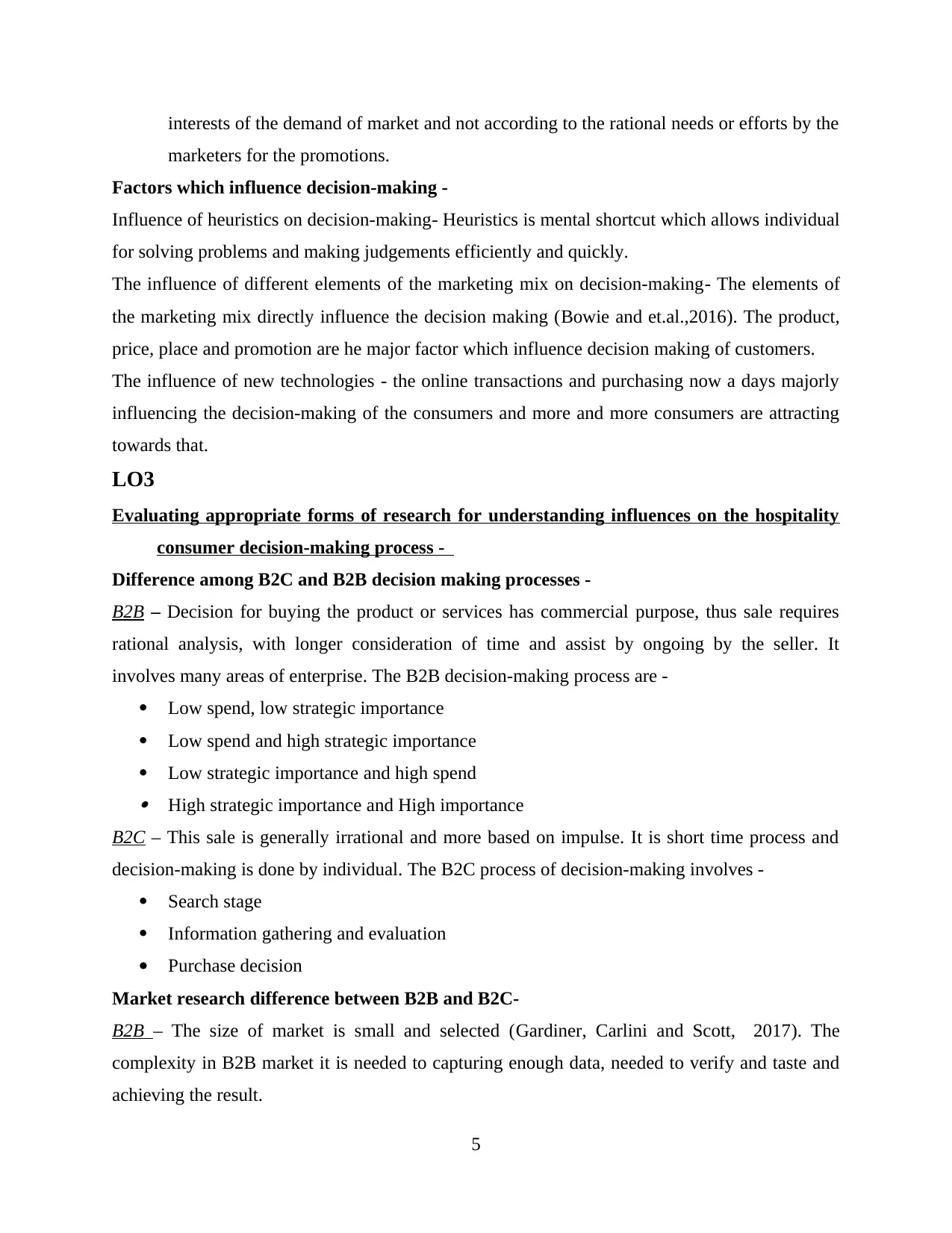
interests of the demand of market and not according to the rational needs or efforts by the
marketers for the promotions.
Factors which influence decision-making -
Influence of heuristics on decision-making- Heuristics is mental shortcut which allows individual
for solving problems and making judgements efficiently and quickly.
The influence of different elements of the marketing mix on decision-making- The elements of
the marketing mix directly influence the decision making (Bowie and et.al.,2016). The product,
price, place and promotion are he major factor which influence decision making of customers.
The influence of new technologies - the online transactions and purchasing now a days majorly
influencing the decision-making of the consumers and more and more consumers are attracting
towards that.
LO3
Evaluating appropriate forms of research for understanding influences on the hospitality
consumer decision-making process -
Difference among B2C and B2B decision making processes -
B2B – Decision for buying the product or services has commercial purpose, thus sale requires
rational analysis, with longer consideration of time and assist by ongoing by the seller. It
involves many areas of enterprise. The B2B decision-making process are -
Low spend, low strategic importance
Low spend and high strategic importance
Low strategic importance and high spend High strategic importance and High importance
B2C – This sale is generally irrational and more based on impulse. It is short time process and
decision-making is done by individual. The B2C process of decision-making involves -
Search stage
Information gathering and evaluation
Purchase decision
Market research difference between B2B and B2C-
B2B – The size of market is small and selected (Gardiner, Carlini and Scott, 2017). The
complexity in B2B market it is needed to capturing enough data, needed to verify and taste and
achieving the result.
5
marketers for the promotions.
Factors which influence decision-making -
Influence of heuristics on decision-making- Heuristics is mental shortcut which allows individual
for solving problems and making judgements efficiently and quickly.
The influence of different elements of the marketing mix on decision-making- The elements of
the marketing mix directly influence the decision making (Bowie and et.al.,2016). The product,
price, place and promotion are he major factor which influence decision making of customers.
The influence of new technologies - the online transactions and purchasing now a days majorly
influencing the decision-making of the consumers and more and more consumers are attracting
towards that.
LO3
Evaluating appropriate forms of research for understanding influences on the hospitality
consumer decision-making process -
Difference among B2C and B2B decision making processes -
B2B – Decision for buying the product or services has commercial purpose, thus sale requires
rational analysis, with longer consideration of time and assist by ongoing by the seller. It
involves many areas of enterprise. The B2B decision-making process are -
Low spend, low strategic importance
Low spend and high strategic importance
Low strategic importance and high spend High strategic importance and High importance
B2C – This sale is generally irrational and more based on impulse. It is short time process and
decision-making is done by individual. The B2C process of decision-making involves -
Search stage
Information gathering and evaluation
Purchase decision
Market research difference between B2B and B2C-
B2B – The size of market is small and selected (Gardiner, Carlini and Scott, 2017). The
complexity in B2B market it is needed to capturing enough data, needed to verify and taste and
achieving the result.
5
Paraphrase This Document
Need a fresh take? Get an instant paraphrase of this document with our AI Paraphraser
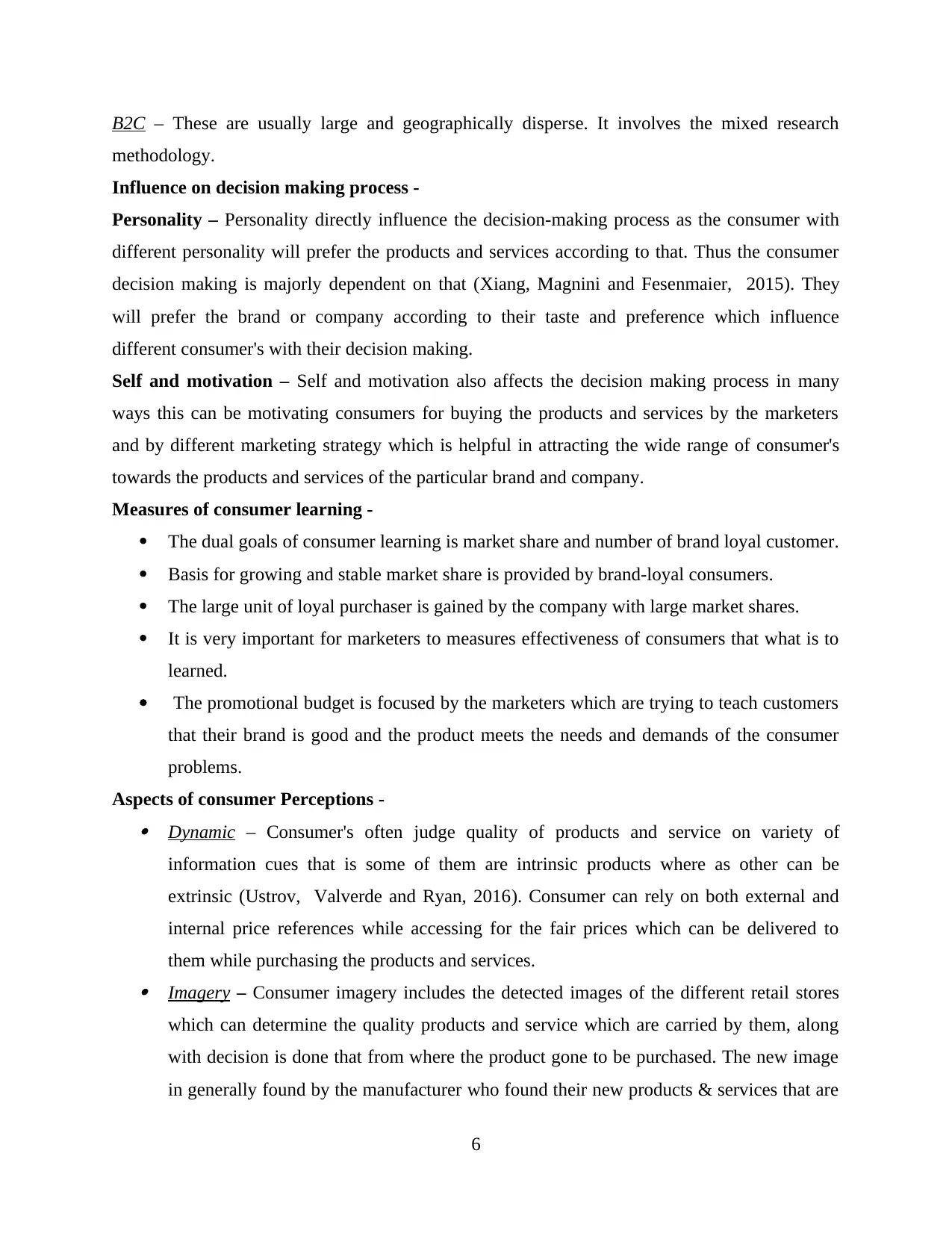
B2C – These are usually large and geographically disperse. It involves the mixed research
methodology.
Influence on decision making process -
Personality – Personality directly influence the decision-making process as the consumer with
different personality will prefer the products and services according to that. Thus the consumer
decision making is majorly dependent on that (Xiang, Magnini and Fesenmaier, 2015). They
will prefer the brand or company according to their taste and preference which influence
different consumer's with their decision making.
Self and motivation – Self and motivation also affects the decision making process in many
ways this can be motivating consumers for buying the products and services by the marketers
and by different marketing strategy which is helpful in attracting the wide range of consumer's
towards the products and services of the particular brand and company.
Measures of consumer learning -
The dual goals of consumer learning is market share and number of brand loyal customer.
Basis for growing and stable market share is provided by brand-loyal consumers.
The large unit of loyal purchaser is gained by the company with large market shares.
It is very important for marketers to measures effectiveness of consumers that what is to
learned.
The promotional budget is focused by the marketers which are trying to teach customers
that their brand is good and the product meets the needs and demands of the consumer
problems.
Aspects of consumer Perceptions - Dynamic – Consumer's often judge quality of products and service on variety of
information cues that is some of them are intrinsic products where as other can be
extrinsic (Ustrov, Valverde and Ryan, 2016). Consumer can rely on both external and
internal price references while accessing for the fair prices which can be delivered to
them while purchasing the products and services. Imagery – Consumer imagery includes the detected images of the different retail stores
which can determine the quality products and service which are carried by them, along
with decision is done that from where the product gone to be purchased. The new image
in generally found by the manufacturer who found their new products & services that are
6
methodology.
Influence on decision making process -
Personality – Personality directly influence the decision-making process as the consumer with
different personality will prefer the products and services according to that. Thus the consumer
decision making is majorly dependent on that (Xiang, Magnini and Fesenmaier, 2015). They
will prefer the brand or company according to their taste and preference which influence
different consumer's with their decision making.
Self and motivation – Self and motivation also affects the decision making process in many
ways this can be motivating consumers for buying the products and services by the marketers
and by different marketing strategy which is helpful in attracting the wide range of consumer's
towards the products and services of the particular brand and company.
Measures of consumer learning -
The dual goals of consumer learning is market share and number of brand loyal customer.
Basis for growing and stable market share is provided by brand-loyal consumers.
The large unit of loyal purchaser is gained by the company with large market shares.
It is very important for marketers to measures effectiveness of consumers that what is to
learned.
The promotional budget is focused by the marketers which are trying to teach customers
that their brand is good and the product meets the needs and demands of the consumer
problems.
Aspects of consumer Perceptions - Dynamic – Consumer's often judge quality of products and service on variety of
information cues that is some of them are intrinsic products where as other can be
extrinsic (Ustrov, Valverde and Ryan, 2016). Consumer can rely on both external and
internal price references while accessing for the fair prices which can be delivered to
them while purchasing the products and services. Imagery – Consumer imagery includes the detected images of the different retail stores
which can determine the quality products and service which are carried by them, along
with decision is done that from where the product gone to be purchased. The new image
in generally found by the manufacturer who found their new products & services that are
6
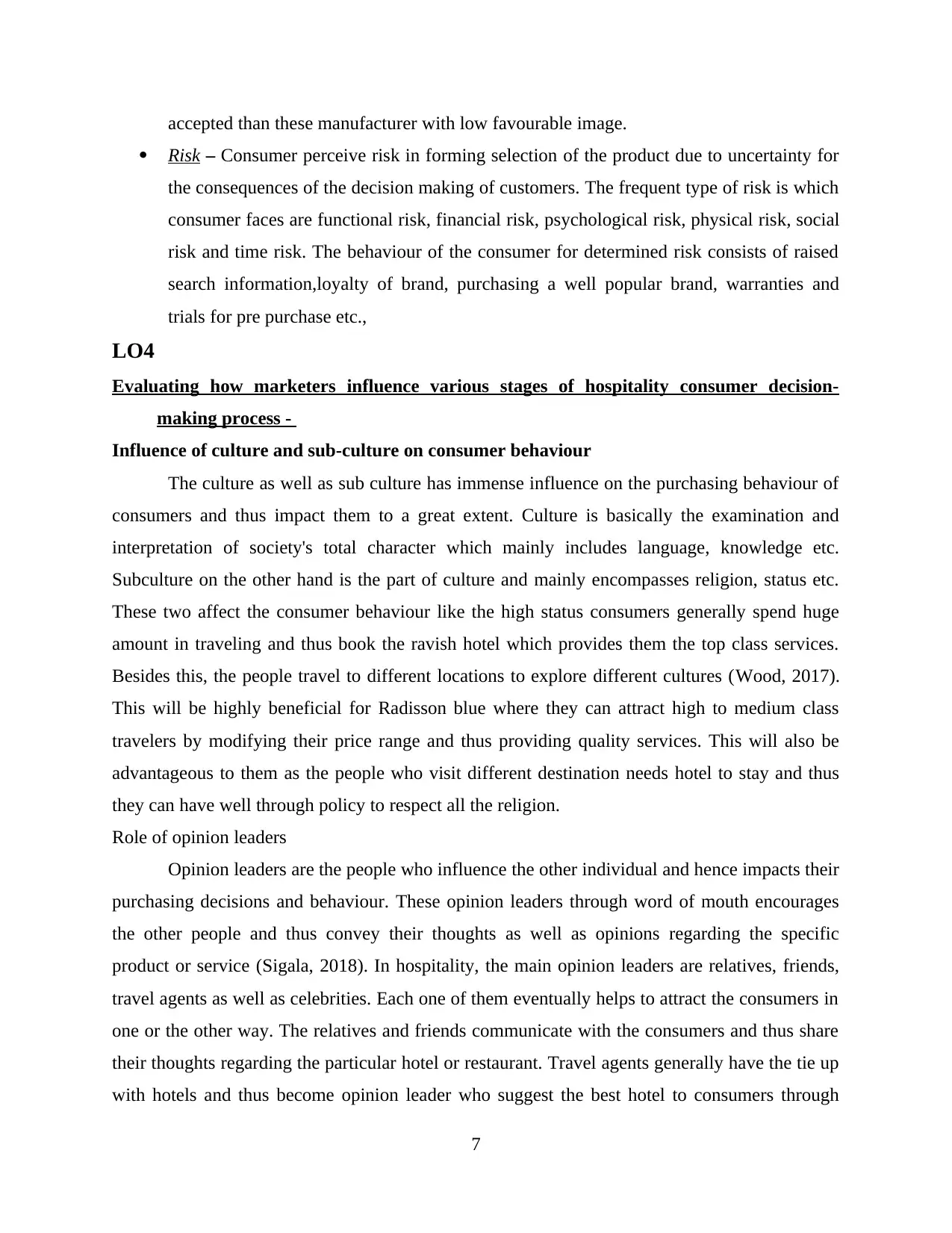
accepted than these manufacturer with low favourable image.
Risk – Consumer perceive risk in forming selection of the product due to uncertainty for
the consequences of the decision making of customers. The frequent type of risk is which
consumer faces are functional risk, financial risk, psychological risk, physical risk, social
risk and time risk. The behaviour of the consumer for determined risk consists of raised
search information,loyalty of brand, purchasing a well popular brand, warranties and
trials for pre purchase etc.,
LO4
Evaluating how marketers influence various stages of hospitality consumer decision-
making process -
Influence of culture and sub-culture on consumer behaviour
The culture as well as sub culture has immense influence on the purchasing behaviour of
consumers and thus impact them to a great extent. Culture is basically the examination and
interpretation of society's total character which mainly includes language, knowledge etc.
Subculture on the other hand is the part of culture and mainly encompasses religion, status etc.
These two affect the consumer behaviour like the high status consumers generally spend huge
amount in traveling and thus book the ravish hotel which provides them the top class services.
Besides this, the people travel to different locations to explore different cultures (Wood, 2017).
This will be highly beneficial for Radisson blue where they can attract high to medium class
travelers by modifying their price range and thus providing quality services. This will also be
advantageous to them as the people who visit different destination needs hotel to stay and thus
they can have well through policy to respect all the religion.
Role of opinion leaders
Opinion leaders are the people who influence the other individual and hence impacts their
purchasing decisions and behaviour. These opinion leaders through word of mouth encourages
the other people and thus convey their thoughts as well as opinions regarding the specific
product or service (Sigala, 2018). In hospitality, the main opinion leaders are relatives, friends,
travel agents as well as celebrities. Each one of them eventually helps to attract the consumers in
one or the other way. The relatives and friends communicate with the consumers and thus share
their thoughts regarding the particular hotel or restaurant. Travel agents generally have the tie up
with hotels and thus become opinion leader who suggest the best hotel to consumers through
7
Risk – Consumer perceive risk in forming selection of the product due to uncertainty for
the consequences of the decision making of customers. The frequent type of risk is which
consumer faces are functional risk, financial risk, psychological risk, physical risk, social
risk and time risk. The behaviour of the consumer for determined risk consists of raised
search information,loyalty of brand, purchasing a well popular brand, warranties and
trials for pre purchase etc.,
LO4
Evaluating how marketers influence various stages of hospitality consumer decision-
making process -
Influence of culture and sub-culture on consumer behaviour
The culture as well as sub culture has immense influence on the purchasing behaviour of
consumers and thus impact them to a great extent. Culture is basically the examination and
interpretation of society's total character which mainly includes language, knowledge etc.
Subculture on the other hand is the part of culture and mainly encompasses religion, status etc.
These two affect the consumer behaviour like the high status consumers generally spend huge
amount in traveling and thus book the ravish hotel which provides them the top class services.
Besides this, the people travel to different locations to explore different cultures (Wood, 2017).
This will be highly beneficial for Radisson blue where they can attract high to medium class
travelers by modifying their price range and thus providing quality services. This will also be
advantageous to them as the people who visit different destination needs hotel to stay and thus
they can have well through policy to respect all the religion.
Role of opinion leaders
Opinion leaders are the people who influence the other individual and hence impacts their
purchasing decisions and behaviour. These opinion leaders through word of mouth encourages
the other people and thus convey their thoughts as well as opinions regarding the specific
product or service (Sigala, 2018). In hospitality, the main opinion leaders are relatives, friends,
travel agents as well as celebrities. Each one of them eventually helps to attract the consumers in
one or the other way. The relatives and friends communicate with the consumers and thus share
their thoughts regarding the particular hotel or restaurant. Travel agents generally have the tie up
with hotels and thus become opinion leader who suggest the best hotel to consumers through
7
⊘ This is a preview!⊘
Do you want full access?
Subscribe today to unlock all pages.

Trusted by 1+ million students worldwide
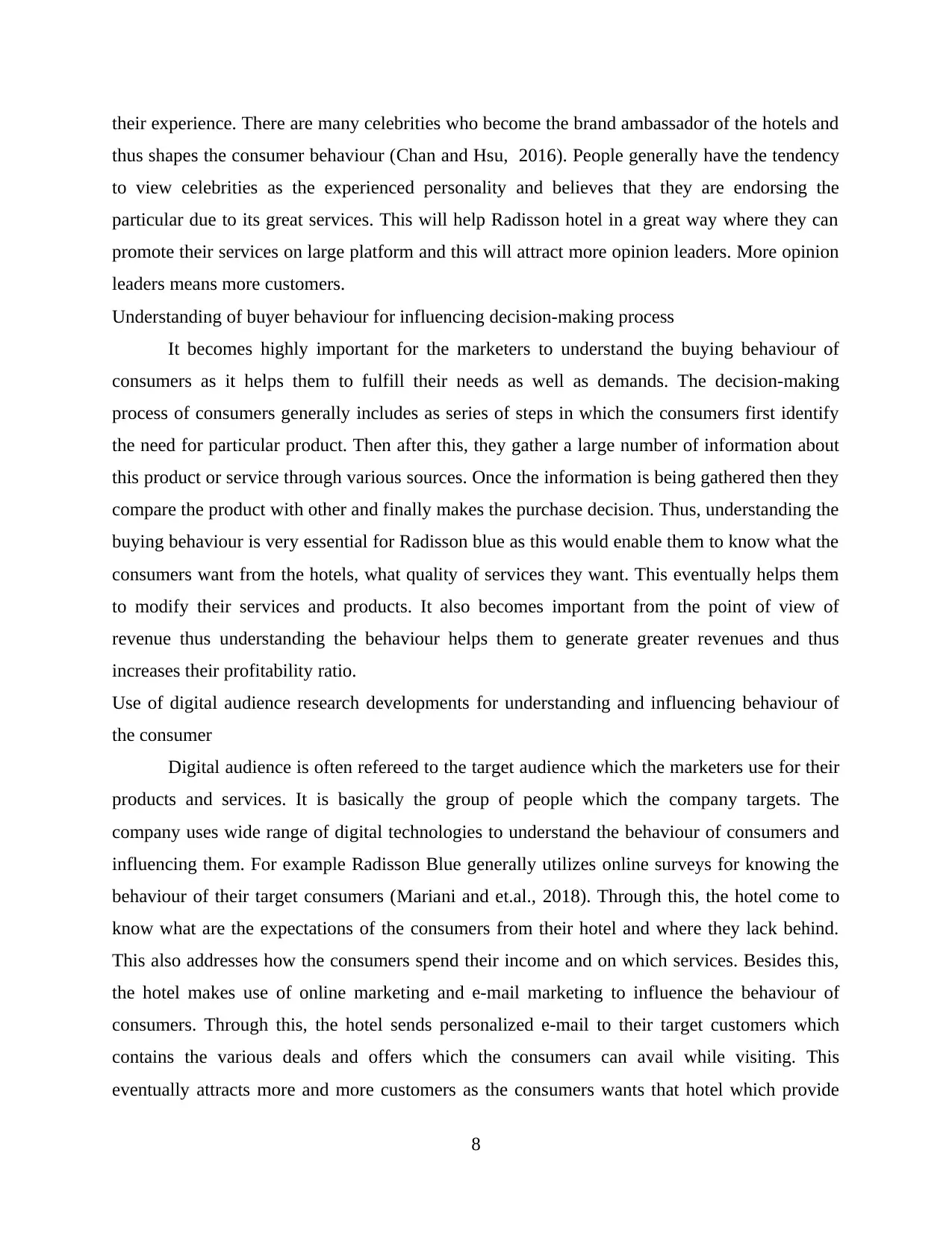
their experience. There are many celebrities who become the brand ambassador of the hotels and
thus shapes the consumer behaviour (Chan and Hsu, 2016). People generally have the tendency
to view celebrities as the experienced personality and believes that they are endorsing the
particular due to its great services. This will help Radisson hotel in a great way where they can
promote their services on large platform and this will attract more opinion leaders. More opinion
leaders means more customers.
Understanding of buyer behaviour for influencing decision-making process
It becomes highly important for the marketers to understand the buying behaviour of
consumers as it helps them to fulfill their needs as well as demands. The decision-making
process of consumers generally includes as series of steps in which the consumers first identify
the need for particular product. Then after this, they gather a large number of information about
this product or service through various sources. Once the information is being gathered then they
compare the product with other and finally makes the purchase decision. Thus, understanding the
buying behaviour is very essential for Radisson blue as this would enable them to know what the
consumers want from the hotels, what quality of services they want. This eventually helps them
to modify their services and products. It also becomes important from the point of view of
revenue thus understanding the behaviour helps them to generate greater revenues and thus
increases their profitability ratio.
Use of digital audience research developments for understanding and influencing behaviour of
the consumer
Digital audience is often refereed to the target audience which the marketers use for their
products and services. It is basically the group of people which the company targets. The
company uses wide range of digital technologies to understand the behaviour of consumers and
influencing them. For example Radisson Blue generally utilizes online surveys for knowing the
behaviour of their target consumers (Mariani and et.al., 2018). Through this, the hotel come to
know what are the expectations of the consumers from their hotel and where they lack behind.
This also addresses how the consumers spend their income and on which services. Besides this,
the hotel makes use of online marketing and e-mail marketing to influence the behaviour of
consumers. Through this, the hotel sends personalized e-mail to their target customers which
contains the various deals and offers which the consumers can avail while visiting. This
eventually attracts more and more customers as the consumers wants that hotel which provide
8
thus shapes the consumer behaviour (Chan and Hsu, 2016). People generally have the tendency
to view celebrities as the experienced personality and believes that they are endorsing the
particular due to its great services. This will help Radisson hotel in a great way where they can
promote their services on large platform and this will attract more opinion leaders. More opinion
leaders means more customers.
Understanding of buyer behaviour for influencing decision-making process
It becomes highly important for the marketers to understand the buying behaviour of
consumers as it helps them to fulfill their needs as well as demands. The decision-making
process of consumers generally includes as series of steps in which the consumers first identify
the need for particular product. Then after this, they gather a large number of information about
this product or service through various sources. Once the information is being gathered then they
compare the product with other and finally makes the purchase decision. Thus, understanding the
buying behaviour is very essential for Radisson blue as this would enable them to know what the
consumers want from the hotels, what quality of services they want. This eventually helps them
to modify their services and products. It also becomes important from the point of view of
revenue thus understanding the behaviour helps them to generate greater revenues and thus
increases their profitability ratio.
Use of digital audience research developments for understanding and influencing behaviour of
the consumer
Digital audience is often refereed to the target audience which the marketers use for their
products and services. It is basically the group of people which the company targets. The
company uses wide range of digital technologies to understand the behaviour of consumers and
influencing them. For example Radisson Blue generally utilizes online surveys for knowing the
behaviour of their target consumers (Mariani and et.al., 2018). Through this, the hotel come to
know what are the expectations of the consumers from their hotel and where they lack behind.
This also addresses how the consumers spend their income and on which services. Besides this,
the hotel makes use of online marketing and e-mail marketing to influence the behaviour of
consumers. Through this, the hotel sends personalized e-mail to their target customers which
contains the various deals and offers which the consumers can avail while visiting. This
eventually attracts more and more customers as the consumers wants that hotel which provide
8
Paraphrase This Document
Need a fresh take? Get an instant paraphrase of this document with our AI Paraphraser
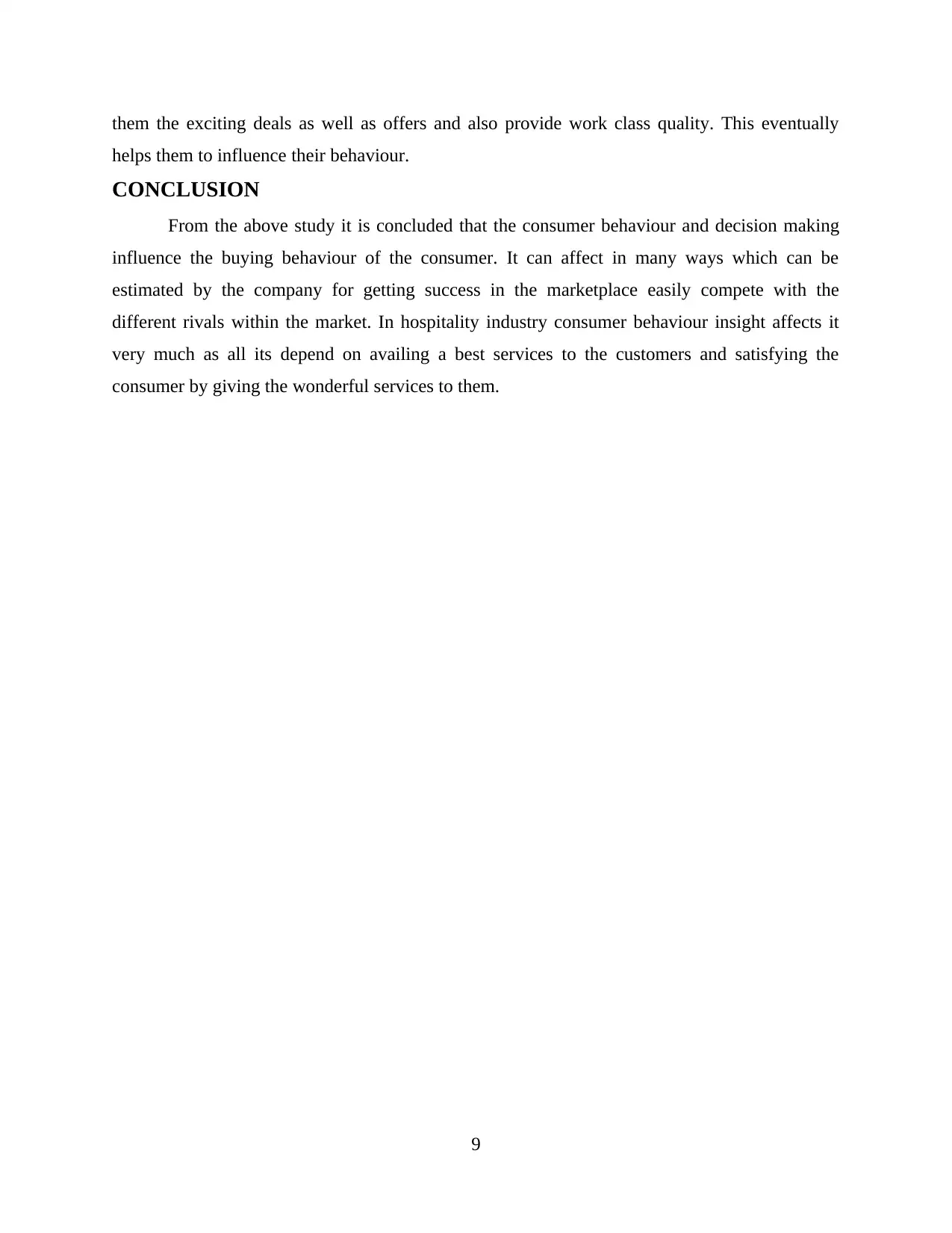
them the exciting deals as well as offers and also provide work class quality. This eventually
helps them to influence their behaviour.
CONCLUSION
From the above study it is concluded that the consumer behaviour and decision making
influence the buying behaviour of the consumer. It can affect in many ways which can be
estimated by the company for getting success in the marketplace easily compete with the
different rivals within the market. In hospitality industry consumer behaviour insight affects it
very much as all its depend on availing a best services to the customers and satisfying the
consumer by giving the wonderful services to them.
9
helps them to influence their behaviour.
CONCLUSION
From the above study it is concluded that the consumer behaviour and decision making
influence the buying behaviour of the consumer. It can affect in many ways which can be
estimated by the company for getting success in the marketplace easily compete with the
different rivals within the market. In hospitality industry consumer behaviour insight affects it
very much as all its depend on availing a best services to the customers and satisfying the
consumer by giving the wonderful services to them.
9
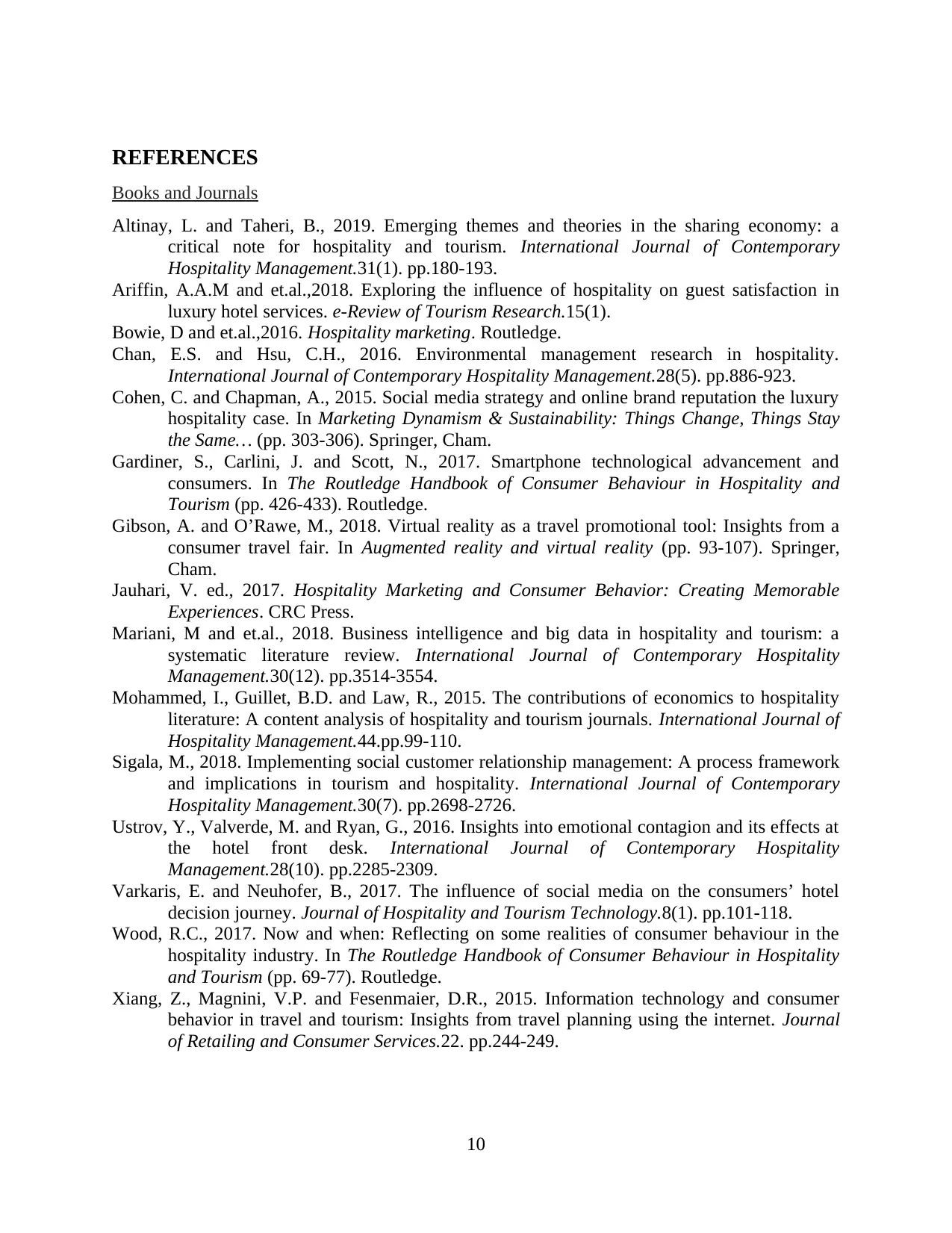
REFERENCES
Books and Journals
Altinay, L. and Taheri, B., 2019. Emerging themes and theories in the sharing economy: a
critical note for hospitality and tourism. International Journal of Contemporary
Hospitality Management.31(1). pp.180-193.
Ariffin, A.A.M and et.al.,2018. Exploring the influence of hospitality on guest satisfaction in
luxury hotel services. e-Review of Tourism Research.15(1).
Bowie, D and et.al.,2016. Hospitality marketing. Routledge.
Chan, E.S. and Hsu, C.H., 2016. Environmental management research in hospitality.
International Journal of Contemporary Hospitality Management.28(5). pp.886-923.
Cohen, C. and Chapman, A., 2015. Social media strategy and online brand reputation the luxury
hospitality case. In Marketing Dynamism & Sustainability: Things Change, Things Stay
the Same… (pp. 303-306). Springer, Cham.
Gardiner, S., Carlini, J. and Scott, N., 2017. Smartphone technological advancement and
consumers. In The Routledge Handbook of Consumer Behaviour in Hospitality and
Tourism (pp. 426-433). Routledge.
Gibson, A. and O’Rawe, M., 2018. Virtual reality as a travel promotional tool: Insights from a
consumer travel fair. In Augmented reality and virtual reality (pp. 93-107). Springer,
Cham.
Jauhari, V. ed., 2017. Hospitality Marketing and Consumer Behavior: Creating Memorable
Experiences. CRC Press.
Mariani, M and et.al., 2018. Business intelligence and big data in hospitality and tourism: a
systematic literature review. International Journal of Contemporary Hospitality
Management.30(12). pp.3514-3554.
Mohammed, I., Guillet, B.D. and Law, R., 2015. The contributions of economics to hospitality
literature: A content analysis of hospitality and tourism journals. International Journal of
Hospitality Management.44.pp.99-110.
Sigala, M., 2018. Implementing social customer relationship management: A process framework
and implications in tourism and hospitality. International Journal of Contemporary
Hospitality Management.30(7). pp.2698-2726.
Ustrov, Y., Valverde, M. and Ryan, G., 2016. Insights into emotional contagion and its effects at
the hotel front desk. International Journal of Contemporary Hospitality
Management.28(10). pp.2285-2309.
Varkaris, E. and Neuhofer, B., 2017. The influence of social media on the consumers’ hotel
decision journey. Journal of Hospitality and Tourism Technology.8(1). pp.101-118.
Wood, R.C., 2017. Now and when: Reflecting on some realities of consumer behaviour in the
hospitality industry. In The Routledge Handbook of Consumer Behaviour in Hospitality
and Tourism (pp. 69-77). Routledge.
Xiang, Z., Magnini, V.P. and Fesenmaier, D.R., 2015. Information technology and consumer
behavior in travel and tourism: Insights from travel planning using the internet. Journal
of Retailing and Consumer Services.22. pp.244-249.
10
Books and Journals
Altinay, L. and Taheri, B., 2019. Emerging themes and theories in the sharing economy: a
critical note for hospitality and tourism. International Journal of Contemporary
Hospitality Management.31(1). pp.180-193.
Ariffin, A.A.M and et.al.,2018. Exploring the influence of hospitality on guest satisfaction in
luxury hotel services. e-Review of Tourism Research.15(1).
Bowie, D and et.al.,2016. Hospitality marketing. Routledge.
Chan, E.S. and Hsu, C.H., 2016. Environmental management research in hospitality.
International Journal of Contemporary Hospitality Management.28(5). pp.886-923.
Cohen, C. and Chapman, A., 2015. Social media strategy and online brand reputation the luxury
hospitality case. In Marketing Dynamism & Sustainability: Things Change, Things Stay
the Same… (pp. 303-306). Springer, Cham.
Gardiner, S., Carlini, J. and Scott, N., 2017. Smartphone technological advancement and
consumers. In The Routledge Handbook of Consumer Behaviour in Hospitality and
Tourism (pp. 426-433). Routledge.
Gibson, A. and O’Rawe, M., 2018. Virtual reality as a travel promotional tool: Insights from a
consumer travel fair. In Augmented reality and virtual reality (pp. 93-107). Springer,
Cham.
Jauhari, V. ed., 2017. Hospitality Marketing and Consumer Behavior: Creating Memorable
Experiences. CRC Press.
Mariani, M and et.al., 2018. Business intelligence and big data in hospitality and tourism: a
systematic literature review. International Journal of Contemporary Hospitality
Management.30(12). pp.3514-3554.
Mohammed, I., Guillet, B.D. and Law, R., 2015. The contributions of economics to hospitality
literature: A content analysis of hospitality and tourism journals. International Journal of
Hospitality Management.44.pp.99-110.
Sigala, M., 2018. Implementing social customer relationship management: A process framework
and implications in tourism and hospitality. International Journal of Contemporary
Hospitality Management.30(7). pp.2698-2726.
Ustrov, Y., Valverde, M. and Ryan, G., 2016. Insights into emotional contagion and its effects at
the hotel front desk. International Journal of Contemporary Hospitality
Management.28(10). pp.2285-2309.
Varkaris, E. and Neuhofer, B., 2017. The influence of social media on the consumers’ hotel
decision journey. Journal of Hospitality and Tourism Technology.8(1). pp.101-118.
Wood, R.C., 2017. Now and when: Reflecting on some realities of consumer behaviour in the
hospitality industry. In The Routledge Handbook of Consumer Behaviour in Hospitality
and Tourism (pp. 69-77). Routledge.
Xiang, Z., Magnini, V.P. and Fesenmaier, D.R., 2015. Information technology and consumer
behavior in travel and tourism: Insights from travel planning using the internet. Journal
of Retailing and Consumer Services.22. pp.244-249.
10
⊘ This is a preview!⊘
Do you want full access?
Subscribe today to unlock all pages.

Trusted by 1+ million students worldwide
1 out of 12
Related Documents
Your All-in-One AI-Powered Toolkit for Academic Success.
+13062052269
info@desklib.com
Available 24*7 on WhatsApp / Email
![[object Object]](/_next/static/media/star-bottom.7253800d.svg)
Unlock your academic potential
Copyright © 2020–2025 A2Z Services. All Rights Reserved. Developed and managed by ZUCOL.

